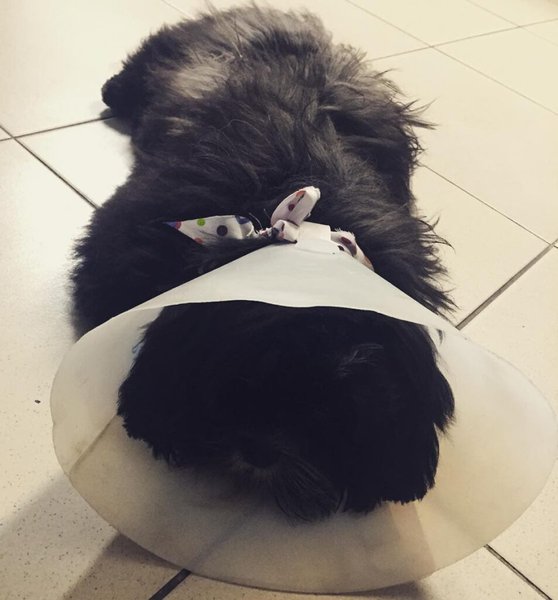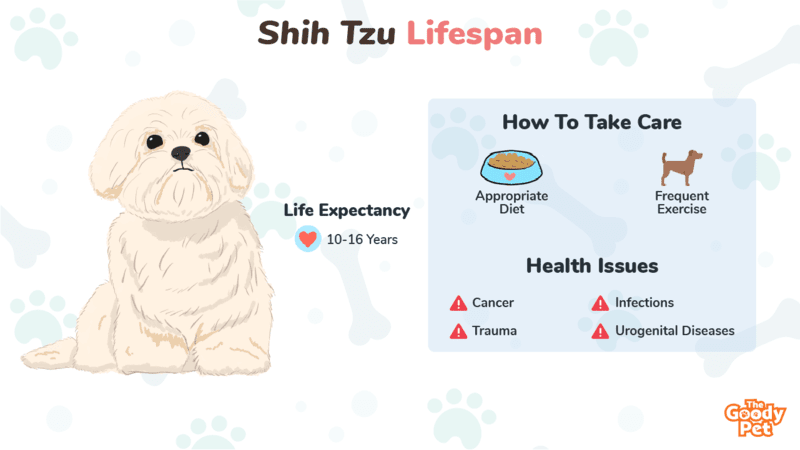Shih Tzus are renowned for their longevity, but if you’re the proud owner of this regal pooch, there are some health conditions you need to be particularly wary of.
Now, what are the common health issues of a Shih Tzu dog? Health conditions that Shih Tzu dogs tend to suffer from during their lifespan include cancer, viral and bacterial infections, as well as various urinary tract diseases. These health conditions are potentially fatal and are responsible for a high percentage of Shih Tzus’ deaths worldwide.
Now that you have an idea of health conditions that are mainly responsible for Shih Tzu deaths, the onus lies on you, as the owner to take proper care of the Shih Tzu to minimize the risk of this pooch contracting the diseases listed above; Today’s article provided tips that serve as a guide in taking care of a Shih Tzu dog and maintaining its quality of life. But before going into that, let’s see how old Shih Tzus usually grow before dying.
What Age Does A Shih Tzu Die?
The lifespan for a Shih Tzu dog typically ranges from between 10 to 16 years for both male and female pooches with an average lifespan of 13 years.
However, this is just an approximate range, and some Shih Tzus live well beyond this age, while others fail to make it into their teens before dying.
Also, from comparing Shih Tzu’s expected age range with that of other dogs, it can be deduced that this pooch has an average lifespan that is neither on the higher or lower end of the dog age spectrum.
While there is no clear-cut guide to how long a Shih Tzu will live, there are certain factors that can play a considerable role in either extending or shortening the Shih Tzu’s lifespan.
Nutrition
The kind of food a Shih Tzu is fed while growing up and when it is fully grown plays a significant role in how long and healthy the pooch will live.
Shih Tzus are prone to developing weight issues, hence you should ensure to feed them only top-quality dog food in moderation.
Exercise
In the same vein, Shih Tzus that are regularly subjected to an appropriate level of exercise are less likely to develop joint diseases and will lead relatively healthier lives than sedentary Shih Tzu dogs.
Health Status
While the Shih Tzu is a relatively healthy dog, there is every tendency for this pooch to inherit a number of genetically transmitted diseases, which may impact negatively on its quality of living.
In addition, by subjecting a Shih Tzu to regular medical examinations, dog owners can detect the occurrence of diseases at an early stage. And once arrangements have been made to tackle the disease in question, the Shih Tzu can go on to lead a healthy life.

What Do Shih Tzus Usually Die Of?
Most Shih Tzus live well into their old age, and if you own one of these beautiful pooches, then there is a high chance that you get to witness it grow from a small, playful puppy into a senior dog before it dies.
However, this is not to say that the Shih Tzu isn’t without its own health challenges. And apart from old age, there are a number of medical conditions that can significantly shorten this pooch’s life which we’ll shortly be taking a look at.
Some of the most common health challenges that Shih Tzu dogs mostly die from include:
Cancer
The dreaded cancer tops the list of diseases that are mostly responsible for Shih Tzu deaths, and several studies have shown that approximately 15% of Shih Tzu dogs die of cancer on a yearly basis.
Cancer can take many forms and affect several body parts, but the most common occurrences in Shih Tzu dogs include mast cell tumors, lymphoma, soft tissue sarcomas, and bone cancer.
Infections
Shih Tzus are susceptible to various viral and bacterial infections, and these can prove to be fatal, if not given the proper medical attention.
Common examples of infections that are responsible for Shih Tzus’ deaths include canine parvovirus, canine distemper, and leptospirosis.
In addition, fungal infections such as blastomycosis and histoplasmosis have also been reported to be the cause of death in some Shih Tzu dogs.
Urogenital Diseases
Urogenital diseases (also commonly referred to as Urinary Tract Infections) are another leading cause of death in Shih Tzu dogs worldwide.
These urogenital diseases typically affect the Shih Tzu’s excretory and reproductive organs such as the urinary bladder, prostate, and urethra and can be very dangerous if left untreated.
Trauma
While this can’t be classified as a medical condition, it is worth noting that injuries resulting from trauma are responsible for a significant amount of Shih Tzu deaths, particularly in puppies.
Trauma can take many forms, and a Shih Tzu can be severely injured when accidentally dropped or stepped on, hit by moving vehicles, or as a result of a fall from high distances.

How Do You Know Your Shih Tzu Is Dying?
Dogs are typically stoic animals, and your Shih Tzu may not show visible signs of pain when it is seriously ill or dying.
However, apart from showing signs of pain, there are some other behaviors and changes you can watch out for to determine whether or not your Shih Tzu is in its final days.
That said, some of the signs exhibited by a dying Shih Tzu include:
- Loss of appetite; Some Shih Tzus may even stop eating altogether.
- Loss of interest in activities and objects that used to excite the pooch.
- Incontinence.
- Irregular breathing.
- Extreme lethargy.
- Shaking due to a dangerously low body temperature.
- Gradual or rapid weight loss.
- Isolation and withdrawal.
It’s not always the case that the signs listed above are an indication that your Shih Tzu is dying, and they can also be a sign that the pooch is suffering from a treatable medical condition.
To be on the safer side, the appropriate thing to do is to take your Shih Tzu for a routine medical check-up immediately you notice the manifestation of these symptoms.
What To Do When Your Shih Tzu Is Dying?
If you notice any of the signs that your Shih Tzu is dying, there are some steps you can take to ensure that the pooch’s final days on earth are as comfortable as possible.
- Provide blankets to ensure that your dying Shih Tzu stays warm at all times.
- You can use appetite stimulants to ensure that your Shih Tzu eats.
- Consult with your vet on the use of the appropriate pain medication for your pooch.
- If your Shih Tzu is avoiding human interaction, then you should respect the pooch’s desire for peace and tranquility.
- Provide non-skid flooring for elderly Shih Tzus that have trouble moving around.
- Ensure easy access to water and food for the Shih Tzu.

How Can I Make My Shih Tzu Live Longer?
Appropriate Diet
The ideal meal for a Shih Tzu dog is one that contains a significant proportion of protein, and the reason for this is not far-fetched. Shih Tzus burn calories faster than most other dogs, and a diet rich in protein will help keep energy levels high.
Shih Tzus also have quite sensitive stomachs, and the dog food you’ll choose for your pooch should be one that doesn’t contain substances that will trigger food allergies in the dog. Fillers, chemical preservatives, a high wheat content, and soy can be detrimental to a Shih Tzu’s health, and these should be avoided at all costs.
It may seem cumbersome having to keep up with all the nutritional requirements of the Shih Tzu. But if what you desire is superior canine food that will meet all your Shih Tzu’s nutritional needs, one meal plan we recommend that you try out for your dog is the Pet Plate.
Pet Plate’s all-natural formulation contains the exact ingredients that provide proper nutrition for small dog breeds like the Shih Tzu. And the food is sized in a way that is convenient for the Shih Tzu to chew and swallow.
You can also feed your Shih Tzu homemade food if you so desire, but you need to ensure that such meals contain ingredients that promote the dog’s growth. And some wholesome and nutritional ingredients that can be incorporated into homemade meals for your Shih Tzu include lamb, white chicken meat, green beans, sweet peas, whole yogurt, and many more.
Also, if you’re feeding your Shih Tzu homemade meals, incorporating mineral supplements such as the Multivitamins Treats Supplement – Zesty Paws Probiotics is essential to supply your pooch with key nutrients that may have been left out unintentionally.
The Zesty Paws Probiotics include ingredients that help strengthen a Shih Tzu’s immune system and these also promote better and healthier digestive functioning.
Water
Apart from feeding your Shih Tzu high-quality dog food, constant access to clean and fresh water is a must for this pooch.
Small dog breeds like the Shih Tzu are prone to several dental infections; Hence, it will be beneficial to invest in dental water additives to maintain great oral hygiene in your Shih Tzu.
How Much Should You Feed Your Shih Tzu In A Day?
The amount of food a Shih Tzu needs is dependent on several factors such as the dog’s age, size, activity level and existing health conditions.
Taking the factors listed above into consideration, most puppy Shih Tzus require 40 to 55 calories per pound of body weight, and this roughly translates into between 1 to 2 oz of food per day.
Older Shih Tzus typically require more calories than puppies. And the 80 to 140 calories per pound of body weight requirement for adult Shih Tzus can be met by feeding the pooch between 2 to 3.4 oz of food per day.
How Often Should You Feed Your Shih Tzu In A Day?
The Shih Tzu dog breed is susceptible to Hypoglycemia, a medical condition that causes the dog’s blood sugar level to be depleted quickly, hence you will need to feed this pooch more often.
Ideally, it is recommended that you feed your puppy Shih Tzus between four to six times a day. The feeding frequency for adult Shih Tzus is lower, and three meals a day will help keep a grown Shih Tzu energized.
Frequent Exercising
The Shih Tzu, being a low energy dog breed, has minimal exercise needs. And brisk walks, twice a day, with each lasting for between 20 to 30 minutes are sufficient to meet this pooch’s exercise needs.
Also, in addition to taking walks, playtime with dog toys and other pooches also work well to keep a Shih Tzu exercised and mentally stimulated.
Related Questions
What Are Shih Tzus Scared Of? Factors that may trigger fear in a Shih Tzu include being around unfamiliar people and surroundings or encounters with other dogs. Also, some Shih Tzu dogs tend to be jumpy when they pay a visit to the groomer and previous traumatic experiences can also trigger fear in a Shih Tzu.
Can Shih Tzu Live 20 Years? The life expectancy for a Shih Tzu dog typically falls between 10 to 16 years. And while it is possible for a Shih Tzu to live into its twenties, chances of that happening are extremely rare. And to show how rare this is, the only available verifiable record of a Shih Tzu dog that lived above 20 years belongs to a pooch named Smokey that lived for 23 years!
How Do I Know If My Shih Tzu Is Overweight? Signs that a Shih Tzu is overweight include a poorly proportioned body shape, inability to scratch an itch, frequent panting and an inability to feel the pooch’s ribs when pressing under its fur. In addition, a medical examination carried out by your vet can help tell if your Shih Tzu is carrying excess weight.





